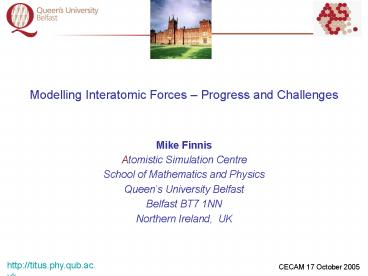Modelling Interatomic Forces Progress and Challenges - PowerPoint PPT Presentation
1 / 30
Title:
Modelling Interatomic Forces Progress and Challenges
Description:
Why make simple models at all when you have ABINIT, CASTEP, CONQUEST, NEWTEP, ... Medieval Renaissance Baroque Romantic. But not too simple! ... – PowerPoint PPT presentation
Number of Views:39
Avg rating:3.0/5.0
Title: Modelling Interatomic Forces Progress and Challenges
1
Modelling Interatomic Forces Progress and
Challenges
- Mike Finnis
- Atomistic Simulation Centre
- School of Mathematics and Physics
- Queens University Belfast
- Belfast BT7 1NN
- Northern Ireland, UK
http//titus.phy.qub.ac.uk
CECAM 17 October 2005
2
Keep it simple
Why make simple models at all when you have
ABINIT, CASTEP, CONQUEST, NEWTEP, SIESTA, VASP,
WIEN2K .
3
Keep it simple
Crack blunting in copper35 million atoms
Courtesy of Brad Holian and Peter Lomdahl
http//bifrost.lanl.gov/
4
Keep it simple
Size is less important to some people.
You may want statistical sampling for time gt 1ns
to find equilibrium free energy Kinetic
Monte-Carlo
5
Keep it simple
SCTB, Thermodynamic integration
ZrO2 Free energy
Fabris, S. Paxton, A. T. Finnis, M. W., Free
energy and molecular dynamics calculations for
the cubic-tetragonal phase transition in
zirconia. Physical Review B 2001, 63
094101-1-13.
6
Keep it simple
- Simple models can be more accurate than DFT LDA
- Band gaps
- Correlated systems van der Waals interaction,
thin films of water
7
Keep it simple
The too-big carpet problem
- Give me n parameters
Medieval Renaissance Baroque Romantic
8
But not too simple!
Look after the baby
- Morse and Lennard-Jones fail on defect energies
and elastic constants - Non-self-consistent tight-binding fails at
defects due to neglect of charge equilibration
and three-centre integrals - Rigid ion/shell models fail on structural
energies and defects
9
Models
- Hybrid schemes
- MGPT
- - EMT
- - EAM
Depending on the structure of the DOS
- Pair potentials
- - empirical
- ab initio
DFT 2nd order
The physics is in the functions
- Ionic Models
- Born
- - shell
- - variable charge
- Tight-binding
- empirical
- self-consistent
- BOPs
10
Variable Charge models
- Rappe, A. K. Goddard, W. A.,
- Charge Equilibration for Molecular Dynamics
Simulations. - Journal of Physical Chemistry 1991, 95, (8),
3358-3363. - Streitz, F. H. Mintmire, J. W.,
- Electrostatic Potentials for Metal-Oxide Surfaces
and Interfaces. - Physical Review B 1994, 50, (16), 11996-12003.
- Campbell, T. J. Aral, G. Ogata, S. Kalia, R.
K. Nakano, A. Vashishta, P., - Oxidation of aluminum nanoclusters.
- Physical Review B 2005, 71, (20), art.
no.-205413.0
11
Bond Order Potentials
Pettifor, D. G., New Many-Body Potential for the
Bond Order. Physical Review Letters 1989, 63,
(22), 2480-2483.
Density matrix
Partial bond order
12
Pair potentials for Al and Ga
Ga
Al
Hafner, J. Heine, V., Theory of the Atomic
Interactions in (s,p)-bonded Metals. Journal of
Physics F Metal Physics 1986, 16, (10),
1429-1458.
13
Ingredients for DFT
Free atom or ion densities
LDA,GGA,
14
The second-order functional
Standard Kohn-Sham
Expand to second order about input charge
density
Elstner, M. Porezag, D. Jungnickel, G. Elsner,
J. Haugk, M. Frauenheim, T. Suhai, S.
Seifert, G., Self-consistent-charge
density-functional tight-binding method for
simulations of complex materials properties.
Physical Review B 1998, 58, 7260-7268.
15
Kernel
16
Variable charge ionic models
17
TB BOPs and all that
18
TB BOPs and all that
Atomic charge neutrality
Assume on-site repulsion keeps charge neutral on
atoms
Enforce by iteration
19
TB BOPs and all that
Enforced neutral atoms
Approximate the trace difference
Inter-site
On-site
20
TB BOPs and all that
Enforced neutral atoms
The repulsive terms
(also dustbin for any other small terms)
Bonding energy model
21
The covalent energy
For orthogonal orbitals this reduces to
22
Environment-dependent BOPs
Haas, H. Wang, C. Z. Fahnle, M. Elsasser, C.
Ho, K. M., Environment-dependent tight-binding
model for molybdenum. Physical Review B 1998,
57, (3), 1461-1470.
Mrovec, M. Nguyen-Manh, D. Pettifor, D. G.
Vitek, V., Bond-order potential for molybdenum
Application to dislocation behavior. Physical
Review B 2004, 69, (9), art. no.-094115.
23
Environment-dependent BOPs
24
Environment-dependent BOPs
25
Environment-dependent BOPs
- Cawkwell, M. J. Nguyen-Manh, D. Woodward, C.
Pettifor, D. G. Vitek, V., - Origin of Brittle Cleavage in Iridium.
- Science 2005, 309, (5737), 1059-1062.
26
Where pair potentials come from
jellium
Non-local XC!
27
Conclusions
- It is advantageous to define a functional both
for understanding the ingredients (eg to avoid
double counting) and to get consistent forces. - The second-order DFT functional is a universal
starting point for most existing models.
28
Challenges
- Is there a reliable universal recipe for oxides?
- Include spin DFT - up and down spin density.
- Build good non-local model functionals for
correlated systems with variable valence - Weld-on non-local terms in C (Van der Waals)
- Include self-consistency and excited electrons
29
Thank you!
Youve heard the talk
30
Thank you!
Youve heard the talk































